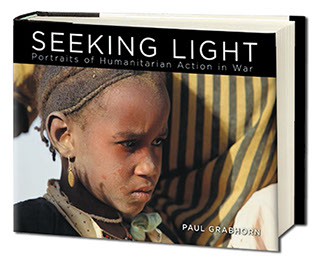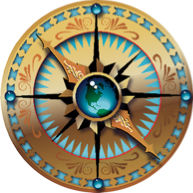
The Dignity Project
Guiding the Way
Promoting awareness and understanding of dignity
through education, communication, and spirit.
As we witness change that renders
a feeling of helplessness, we can
at the same time call forth ways of
living and serving that are based in
the good of all and a palpable
sense of the unlimited capacity of
the human spirit.








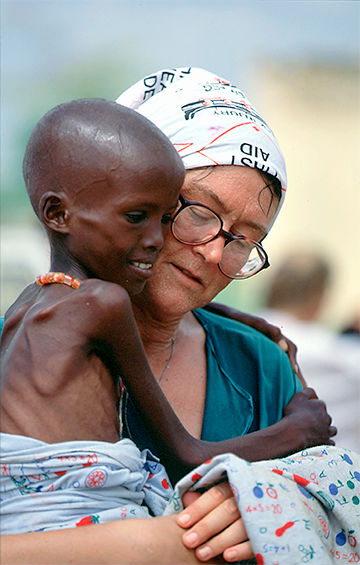
CALL TO ACTION
Times of crises call for human dignity as a
transformative function that can give a new foundation to our collective life. By connecting people to their deepest source of ethics and caring, dignity will play a pivotal role in promoting the inner transformations needed to ward off collapse and despair.
Dignity gives rise to compassion, which is
informed by a sense of conscience that sees suffering as an opportunity to enter
situations of crisis not afraid to engage.
Compassion considers others as not
essentially different from us. Each of us has a calling, a task that enables better community.
ICRC nurse comforts a child at a large refugee
encampment in Somalia. The child also comforted the
nurse who had been up all night in the surgery ward
helping wounded refugees who were shot by bandits
attempting to steal food. Kismayo Somalia 1990
©Paul Grabhorn
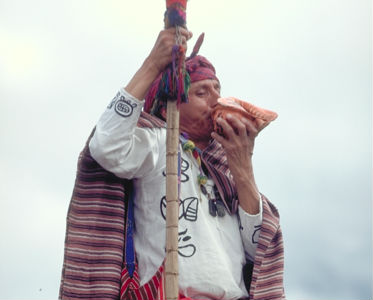
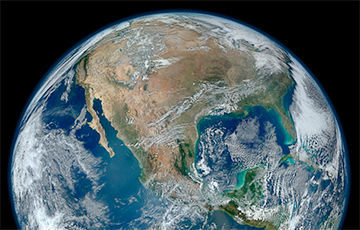
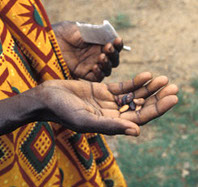
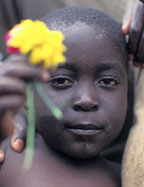
APPROACH
For dignity to guide us through situations
of crisis, its scope must be extended and deepened, drawing out fresh implications
and applications pertaining to our way of knowing ourselves and to our relationship with others and the land.
Seeing how all living beings are bound
together, showing intricate symbiotic
relationships, we respect all forms of life.
Seeing how living beings are engaged in a
continuous exchange of material within their
surroundings, we begin to regard the
environment as sacred - as the sphere in
which life unfolds, and valuable for its
intelligence and beauty. We are called to consider the long-term effects our actions
have on others and on the biosphere.
Dignity shifts us from separation and self-centered actions to feelings of connectedness, consideration, and compassion for life. This is groundwork for a transformative process within individuals and communities.
TOP: In Guatemala a shaman begins a peace and reconciliation ceremony by blowing a conch shell atop a
pyramid at a sacred site in Huehuetanango, Guatemala 1997. MIDDLE: Blue Planet ©NASA BOTTOM LEFT: A man holds bean seeds being distributed by the ICRC to vulnerable people in Cibitoke, Burundi. BOTTOM RIGHT:
At a large refugee encampment in the Congo a Rwandan boy offers a flower to the photographer. North of Bukavu, DRC 1995 All other photographs ©Paul Grabhorn
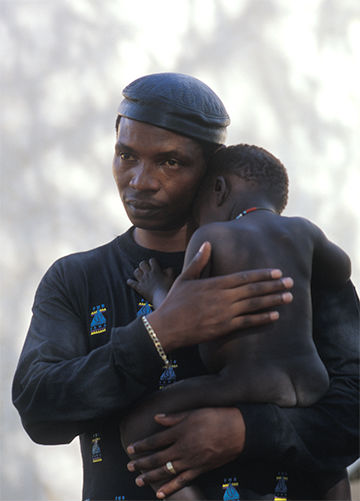
CHARGE
Now is the time to restore the vision of
communities supporting the well-being of
its citizens. The basis of a society that fosters dignity is one that expresses respect for children, the land, and the sacred. When these three are seen as the promise of quality existence, other aspects of society can grow and blossom.
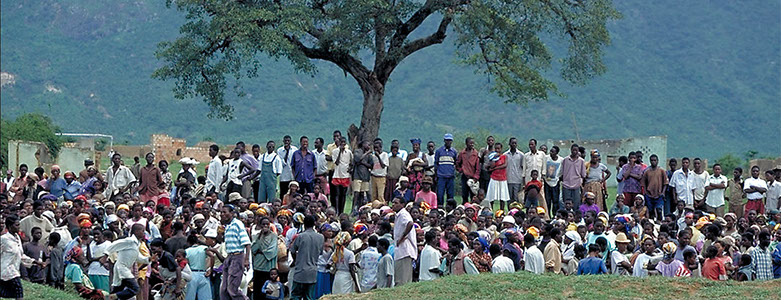
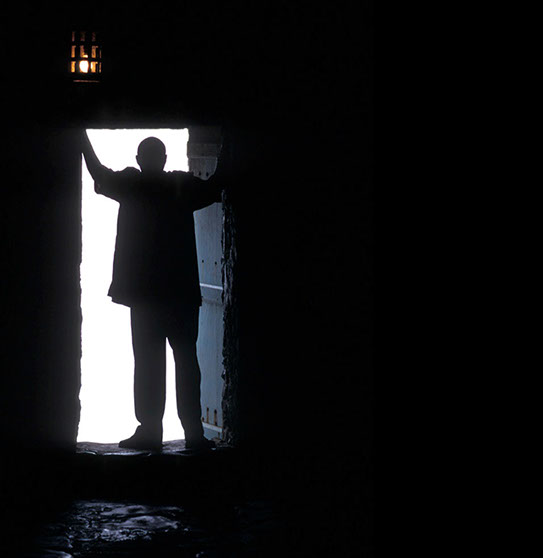
To live in dignity is to stand up for the rights of all members of society; to stand up for the rights of the disadvantaged, for those too young to speak, for those who can speak but are not listened to until age is no longer a qualification of wisdom; to stand up for the aged who have been cast out, and include them in the integrity of the human society.
TOP: Jabu Khanyile, a South African musician, comforts a child at an ICRC surgical hospital in Northern Kenya on the border with South Sudan. Lokichokio, Kenya 1996
MIDDLE: In Angola, a village waits patiently for the trucks from an ICRC convoy of food relief to be unloaded. Huambo, Angola 1995.
BOTTOM: Jabu Khanyile stands at the “Door of No Return” that led to slave ships. Millions of slaves are said to have stepped through this door to the Americas. Gori Island, Senegal 1997. Photographs ©Paul Grabhorn
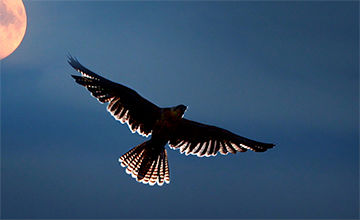
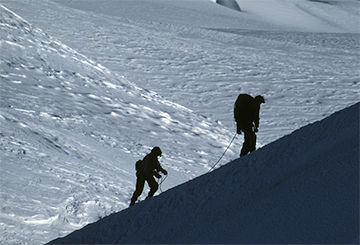
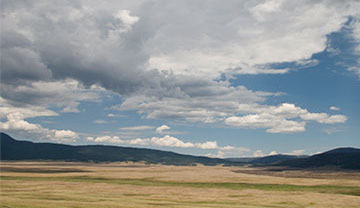
TOP: Hawk and the moon. ©Shutterstock
MIDDLE: Two climbers hike a snowy slope on Mount Blanc in Switzerland. BOTTOM: A valley in northern New Mexico - the big sky of “Land of Enchantment”. All other Photographs ©Paul Grabhorn
COMMUNICATIONS CAMPAIGN
Dignity Project is a communication campaign
aimed at the general public. The goal is to
promote awareness and understanding of
dignity through creative expression that
captures the attention of those who are at the threshold of change.
Productions offer new ways of looking at
humanity living in harmony with the
earth that include respect for children, the
land, and the sacred. Rich visual and
multimedia information and experiences
engage participants in reflection,
communication, and dialogue.
The campaign fluidly adapts its structure,
teams, and processes, to meet the changing
needs of multiple parallel projects. Each
project is leveraged with capital, ideas, and
people, until they take on momentum and generate revenue. The Dignity Project functions as a small-scale incubator for a variety of highly-tuned teams working on projects that unfold aspects of dignity as they pertain to the environment and humanity.
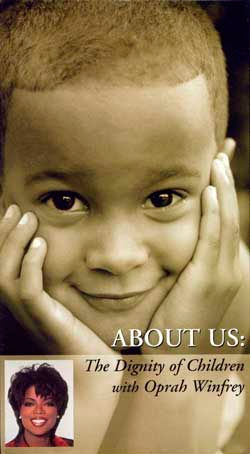
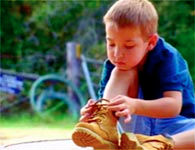
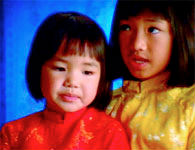

ABOUT US: The Dignity of Children
An ABC television network special
Film: About Us: The Dignity of Children
Executive Producers: Fred Berner, Debra Reynolds, Jeffrey Jacobs
The Children’s Dignity Project film is a wake-up call to the nation. It is designed to alter forever how we view children. Aired on ABC this two-hour prime-time special explores the nature and experience of childhood by probing issues crucial to us all—family, community, moral values, spirituality, and self expression. About Us, moderated by Oprah Winfrey, is a tapestry of dramatic film, realistic documentary images, and animation, creating a mood that engages the heart, mind and imagination. It conveys the wondrous and precarious journey of childhood and reacquaints the viewer with this delicate and formative time. The film is designed to present the true voice of children—the voice that questions, that speaks their fears, joys and hopes.
Produced by Fred Berner Films, New York. Fred Berner has
produced both Hollywood and independent films, including
Vanya on 42nd Street (directed by Louis Malle); The Ballad of
Little Jo; Lakota Woman; Pollock; Hidden in America; The
Great White Hype; Law and Order.
About Us: The Dignity of Children was made possible by a
generous commitment from Capital Cities/ABC, giving it the
promotion and visibility necessary to reach the largest possible audience. The film received an Emmy nomination and
the prestigious President's Award, in recognition of its
excellence.
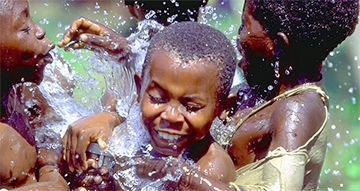
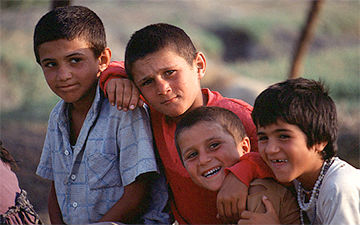
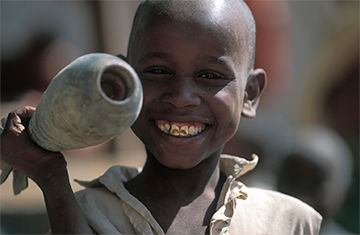
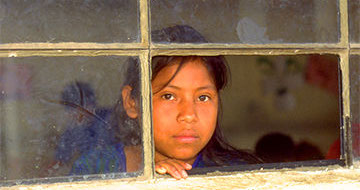
TOP: Boys play in freshwater being released from a tanker truck that got stuck in wet sand in Burundi, 1995.
UPPER MIDDLE: Children play in a refugee encampment on the western border of Azerbaidjan with Ngorno Karabak. LOWER MIDDLE: A boy plays with a rocket propelled grenade that has the detonator removed. Baidoa, Somalia 1992. BOTTOM: A student looks out through a broken window in her school. Guatemala. Photographs ©Paul Grabhorn
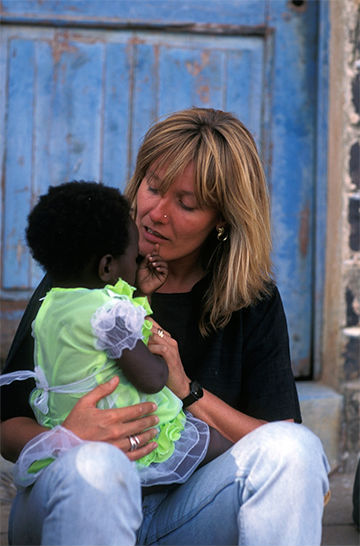
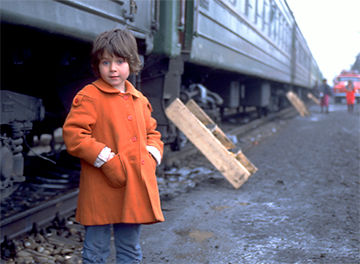
EDUCATION CAMPAIGN
THE DIGNITY OF CHILDREN
One of the fundamental concerns of our time
is the status of our children. History makes
evident the confusion about the nature of the child and shows the child to be of an exploited class. The nightmare continues for today's children as isolation, escape, frustration, and maltreatment cycle through the generations. Until we come to a broader understanding of the crisis, no amount of social, economic or philosophical change will be sufficient to afford children the protection from harm they require to achieve their full potential and become productive, rather than destructive or burdensome members of society.
The Dignity Project identifies the fundamental changes now occurring which make this an age of anxiety and violence: loss of values, loss of relationship to nature, the movement from a community-based society to an individualistic society, and unreasonable and unhealthy demands on the nuclear family.
We have failed to "see" the child. The solution calls for us to know the child and his absolute right to dignity. It calls for an environment that is safe and inviting to children, which will unleash their potential for unique expression.
The Education Campaign promotes the recognition of the universal needs of children and fosters the development of dignity through training and education for youth and child advocates.
Designed for symposia, study and training programs, and community outreach, the campaign provides a variety of opportunities for exploration and discovery of self and one's relationship to others and the earth.
PROGRAM PHILOSOPHY
It is through our desire to know ourselves and
our excitement about who we are that we will
move beyond the crisis of confusion, violence
and separation. As we value ourselves, we
begin to recognize the value of another human life.
COMPONENTS OF DIGNITY
To instate dignity is to help a person achieve a sense of accomplishment.
It is to nurture his sense of belonging to the
human family and to the earth.
It is to teach him that he has the right to have personal boundaries and that he has a voice in what takes place in the world and in his own life.
It is to foster the spirit of generosity, that he
may become a contributing member of the
community.
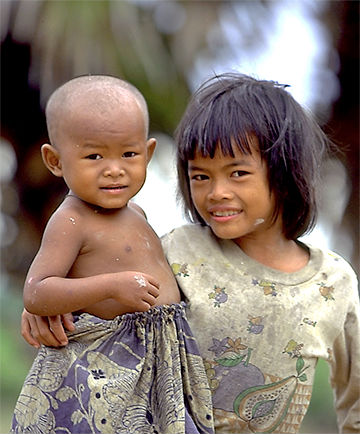
TOP: An ICRC delegate admires the new dress of a girl in a rural village outside Huambo Angola. MIDDLE: A refugee girl outside the train that has become her home in Nazran Ingushetia close to the border with Chechnya. BOTTOM: Sister carries brother while they wait for rice to be distributed in rural Cambodia. Photographs ©Paul Grabhorn
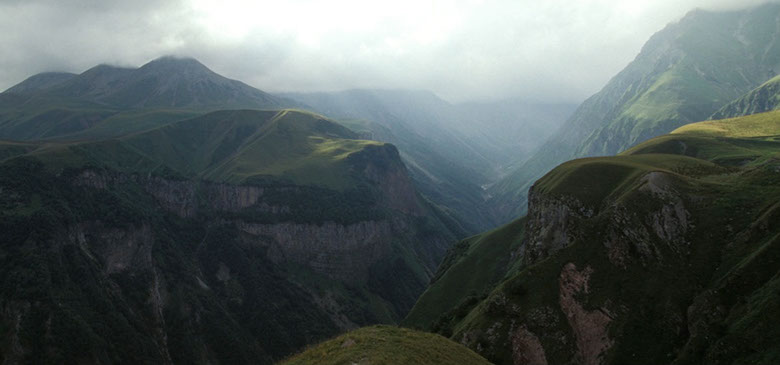
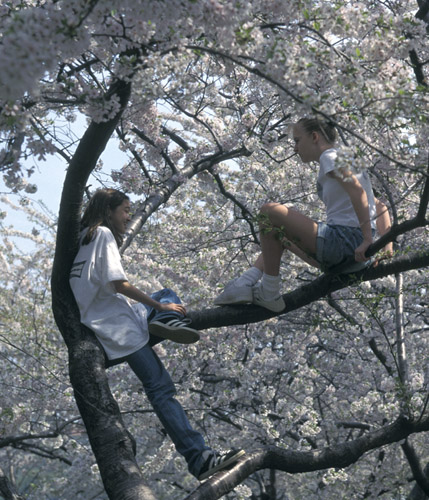
YOUTH & ADVOCATES PROGRAMS
Our response as a nation to the fragmentation of our society has been autonomy: to become self-determining and independent. The Dignity Project believes that the pendulum needs to swing toward the renewal of connections, for life arises out of the innate unity of body, mind, spirit, community, and world.
The Youth and Advocates Programs deepen
one's ability to be in service to others. Modules are based in three areas of self-discovery:
• Creativity and Intuition
• Communication
• Experiencing Nature as a Teacher

TOP: Sunlight washes a valley in the foothills of the Caucusus mountains in Georgia. MIDDLE: Girls in a cherry tree in Washington DC. BOTTOM: Geese swim in the evening light at Great Meadows wildlife sanctuary in Concord Massachusetts. Photographs ©Paul Grabhorn

©Dana Gluckstein
"Through intuition, everything separated by perceiving is unified”
Debra Reynolds
Debra Reynolds is an educator and consultant whose life work involves the application of intuition and exploring the multi-layered nature of life. With an emphasis on self-awareness, she explores innate ways of being, engaging, and growing, and the life themes, challenges, and sensitivities that inform our life. Through programs that help to heal childhood and collective patterns of repressing creative expression and the intuitive faculty that allow us to be individuals, the potential of our central purpose is activated and our capacity for compassion and relationship with the collective are enhanced.
Debra’s research resulted in the development of The Dignity Project, a unique program for child advocates with an emphasis on self awareness. For eighteen years she conducted retreats on creativity and intuition, founding Four Winds Institute in the mountains of Santa Fe, New Mexico.
Contributions and projects include:
- Moderator ~ 1997 Summit on Children’s Rights in Vienna, Austria
- Board of Counselors ~ CIVITAS Initiative, providing scholarships and interdisciplinary education in child abuse at Chicago Loyola Law School, Baylor College of Medicine, and University of Michigan School of Social Work
- Executive producer ~ award-winning ABC network special, About Us: The Dignity of Children, with video sales in three languages
- Author of The Dignity of Children, identifying the universal needs of children
Debra is a consultant on an individual basis and in the fields of science, medicine, and business
- providing insight and perspective for planning and development
- identifying layers and patterns within personal and professional relationships and endeavors
- augmenting objective points of view
- providing necessary components for understanding, moving forward, or changing direction
- offering consideration of sequence, variables, context, and imperatives, desire, and vision
Clients include:
Stanford Research Institute, MIT, The Institute of Noetic Sciences, World Business Academy, Naturaceutical Dispensing, Farm from a Box, The Capital Group, national and international corporations and government officials, non-profits and small businesses.
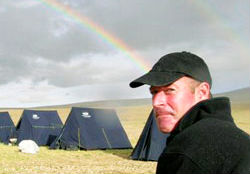
In Gratitude - 1956-2018
Paul Grabhorn
Paul Grabhorn is a photographer and communications
producer. He has served three White House
administrations, producing communication materials for
their environmental and sustainable development
initiatives. He participated in International Committee
of the Red Cross missions (ICRC) photographing
in Somalia, Bosnia, Angola, South Sudan, Azerbaijan, Georgia, Chechnya, and many other countries.
Grabhorn is author of Seeking Light: Portraits of
Humanitarian Action in War, a profoundly moving
collection of unforgettable photographs from conflict
zones around the world. Taken during his travels with ICRC, these images document the humanitarian work in war-torn countries that is a testament to human compassion and community. He tells an essential story of hope in the face of violence and deplorable conditions, dignity in the midst of degradation, and light in the darkness of war and suffering.
DIGNITY
Our true state of being that stands for relationship with all forms of life as loving and honorable.

Contact Information
Email Debra Reynolds at:
debra@dignityproject.org
Download Navigating Chaos Essays by Debra Reynolds
10. Containment
11. We the people
12. Time-out
13. The compass
14. Pattern breakers
15. A million tears
©2022 The Dignity Project, All Rights Reserved
